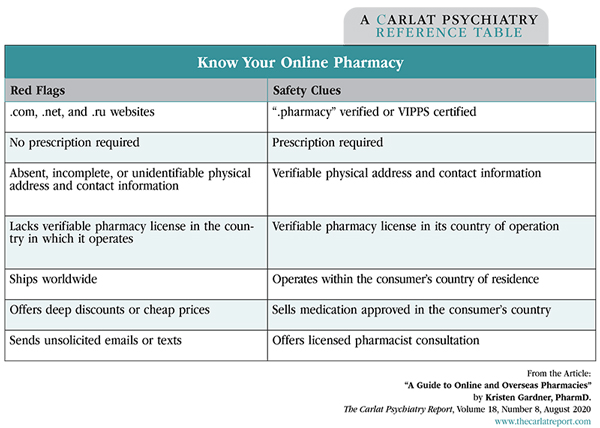A Guide to Online and Overseas Pharmacies
You’ve probably seen these scenarios in your practice. A patient doing well on Latuda can’t afford the $800 monthly cost with a new insurance plan. Another patient on disulfiram can’t find the medication because there is a nationwide shortage. Someone else expresses interest in medications used in other countries like amisulpride, tianeptine, or agomelatine. Can an online pharmacy help these patients “thread the needle”?
Background
US prescription drug costs have been increasing for decades. But e-commerce, where you can purchase just about anything on the internet, has also gotten more prevalent. So why not obtain prescriptions that way too? The first online pharmacy launched in 1999. As of 2015, there were more than 35,000 online pharmacies operating across the globe, and 1 in 4 online shoppers order prescription medications online. They value the perceived lower cost and higher privacy, convenience, and autonomy (Mackey TK and Nayyar G, Br Med Bull 2016;118:115). Each of those factors can improve adherence—particularly cost, which prevents 1 in 3 adults from taking their medications regularly (Kirzinger A et al, JAMA 2019;322(15):1440). But there is a dark side to the boon of online ordering.
The best and the worst
Ideally, an online pharmacy will follow the laws and regulations of both the country where its operations are occurring and the country it’s shipping to. The key sign that an online pharmacy is legit is if its web address ends with the “.pharmacy” domain. This means the pharmacy participates in on-site inspections from the National Association of Boards of Pharmacy (NABP). Certified pharmacies may also display the Verified Internet Pharmacy Practice Sites (VIPPS) seal of approval. The VIPPS program recently transitioned into the “.pharmacy” program to prevent companies from forging the seal. So far, “.pharmacy” domains cannot be faked.
We don’t recommend using online pharmacies that lack NABP/VIPPS certification. If patients go that route on their own, the “Know Your Online Pharmacy” table on page 7 lists red flags to watch out for.
Unfortunately, most online pharmacies are illegitimate, rogue, or illicit. A stunning 96% of them either don’t comply with regulations or aren’t subject to regulatory review, licensure, or certification. In particular, they often sell imported medications worldwide, and it’s hard to know whether imported drugs meet FDA standards for safety and efficacy since they bypass closed, regulated supply chains.
The safety concern associated with these drugs is real—the World Health Organization has determined that more than 80% of medicines are counterfeit in some countries. The market for counterfeit drugs is worth an annual $431 billion and surpasses almost everything else in the underground economy, including prostitution, human trafficking, and illegal weapon sales. Additionally, drugs sold by illicit online pharmacies may contain dangerous substances such as rat poison, mercury, or antifreeze; be improperly stored; be old/expired; or be poorly manufactured in unsafe conditions or with low-quality ingredients. Besides the health risks, rogue online pharmacies may lack safeguards to protect consumers’ finances, personal data, and electronic devices.
Online Canadian pharmacies are safe, right?
Most online pharmacies that advertise as Canadian actually have no connection to the country at all. When a US citizen purchases medications through a “Canadian” pharmacy, chances are high that the person will receive a drug that wasn’t approved by Canadian regulatory agencies. Even Canadian government and organizational officials are concerned about US importation of drugs from Canada. Since Canada is struggling with similar issues, they have borrowed NABP’s “.pharmacy” program. However, only pharmacies licensed in Canada dispensing Health Canada–approved products to Canadian citizens are eligible for a “.pharmacy” domain. Ultimately, it is illegal for non-US pharmacies to import drugs into the US.
How to protect your patients
Patients may not tell you that they are using online pharmacies, so open up the conversation by asking them where they plan to purchase their medications. Those who are more likely to go the online route include older adults, indigent patients, and those with financial problems or coverage limitations.
If patients tell you they plan to order online, give them a list of safe options. Two websites with reliable lists are the VIPPS program (www.nabp.pharmacy/programs/digital-pharmacy/accredited-facilities) and BuySafeRx (www.safe.pharmacy/buy-safely). Alternatively, patients can check if an online pharmacy is safe by entering its internet address at www.VerifyBeforeYouBuy.org.
Other ways to lower costs
Before patients turn to internet pharmacies, there may be other ways to lower their costs. Advise patients to check out reputable websites like GoodRx.com, NeedyMeds.org, RefillWise.com, or SaveOnMyMeds.org. These websites do the legwork to compare local prescription costs. Some of them (NeedyMeds.org and SaveOnMyMeds.org) also connect to manufacturer patient assistance programs. Asking pharmacies for “the cash price” of a drug may yield lower costs than using insurance. There may even be payment plans or financial assistance programs available from insurers or health systems.
Consolidate doses and make use of half-tablets if they can be safely cut, especially if the drug has flat pricing. Just make sure that you write the prescription the way you intend the patient to take it—it’s fraudulent to raise the dose artificially. For example, if you intend the patient to take Latuda 60 mg daily, don’t prescribe 120 mg 1 tablet daily #30 and tell the patient to cut the pills in half in order to save on copays. A 90-day supply will usually lower costs, both for patients on insurance and those who are paying for the medication out-of-pocket.
TCPR Verdict: Legitimate online pharmacies offer convenience, privacy, and cost savings. Many of your patients are already using them, so open up the conversation and let them know where to find reliable sources that are either VIPPS certified or part of the “.pharmacy” program.
Table: Know Your Online Pharmacy
(Click to view full-size PDF.)
Newsletters
Please see our Terms and Conditions, Privacy Policy, Subscription Agreement, Use of Cookies, and Hardware/Software Requirements to view our website.
© 2026 Carlat Publishing, LLC and Affiliates, All Rights Reserved.



_-The-Breakthrough-Antipsychotic-That-Could-Change-Everything.webp?t=1729528747)



